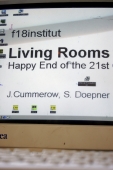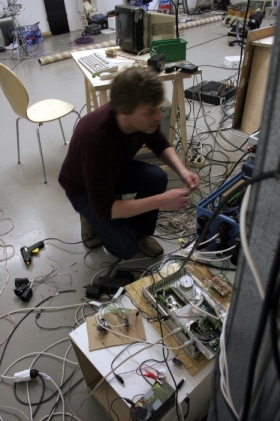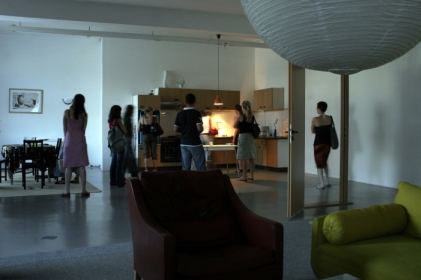Stefan Doepner
Stefan Doepner is an artist from Bremen, Hamburg, living now in Ljubljana. He has been involved in important artistic & social initiatives in the nineties and participated with various renown artists and institutions. His projects can be observed here (http://www.f18institut.org). He proposes a part of an installation with the working title LivingRoom – the project that is being built just now.
Description of his comprehensive project LivingRooms (the LivingKitchen is a part of it):
 Our world, especially in terms of communication, production and transport as well as ‘at Home’, consist largely out of embedded, capsulated machines. Meanwhile one uses these ‘Blackboxes’ partly more self-evident than most simple tools like pencil or hammer. The complexity of technology, development, mechanic and electronic of our everyday devices is not translated into our reception. The system behind, the creation, conditions and user-optimisation is in no way transparent.
Our world, especially in terms of communication, production and transport as well as ‘at Home’, consist largely out of embedded, capsulated machines. Meanwhile one uses these ‘Blackboxes’ partly more self-evident than most simple tools like pencil or hammer. The complexity of technology, development, mechanic and electronic of our everyday devices is not translated into our reception. The system behind, the creation, conditions and user-optimisation is in no way transparent.
This applies even for our not motorised or electric driven surrounding, the ideal kitchen of Bauhaus for example, which dimensions where created considering the shortest distance between the different work-stations or the whole format of our flat-units, this all is based on theories which want to make our life / daily living systematically ‘easier and better’.
This thread of systematic runs through these developments and inventions which should serve us, often with the help of complex units which we shall be able to use easy and fast. Starting with the electrified kitchen via the electronic bureau and virtual space towards ‘Augmented Environment’ or ‘Ambient Intelligence’ (s.2/4), a mixture of virtual and real space.
 With our Installation we want to approach this phenomena on a not object orientated level, similar to the quote of O.Onnen (s.1). The relation man č machine consist at least out of two levels, the function orientated ‘what can I do with it and what do I gain out of it-‘ and the aesthetic ‘how do I feel with it-‘ relation. We will create an as well post- as pre-ideal picture which you can apply to several ideas and dreams for to improve our environment and which supports you to find an own position.
With our Installation we want to approach this phenomena on a not object orientated level, similar to the quote of O.Onnen (s.1). The relation man č machine consist at least out of two levels, the function orientated ‘what can I do with it and what do I gain out of it-‘ and the aesthetic ‘how do I feel with it-‘ relation. We will create an as well post- as pre-ideal picture which you can apply to several ideas and dreams for to improve our environment and which supports you to find an own position.
The Installation offers the visitor to explore his own everyday world which is implemented in the ideas of automation and duty. A moment of sensual and aesthetic reception of an almost normal situation arises, which offers the opportunity to visitor to visualise an straightened image from the distance of a free spectator.
Scenery:
LivingRoom A standard formatted flat, ca. 70mč floorspace, no walls but doors. The single areas will not be direct attached to another but arranged with some distance between each other. There will be kitchen, sleeping-room, bath, living-room and hobby-area. Each area is equipped with ubiquitous devices and tools č furniture, kitchen devices, accessories and tools. All areas resp. Devices function until a certain degree, however, there function is not created by use, it is subject of an own dynamic.
The flat and the objects take on a life of their own, it seems the flat generates a possible inhabitant in virtual state. It arises a course of action at furniture and with accessories which then increasingly dissolve and runs into a somehow escalating independence. Single elements leave the inner space of their areas, stray through the other departments and even leave completely the living-area out into the outer world of the gallery.
 Other elements start their life on the spot č some kind of orchestra out of kitchen-devices, tools and trunks, chairs and tables jump in rocking rhythmic and they all begin an absurd dance. Part by part the objects calm slowly down, some still give voice, the mobile furniture move back to their stations and the virtual inhabitant moves back to bed, the light closes down. The inner-space of the living-area relates to the outer-space, therefore the gallery space, as reality to medial reflection.
Other elements start their life on the spot č some kind of orchestra out of kitchen-devices, tools and trunks, chairs and tables jump in rocking rhythmic and they all begin an absurd dance. Part by part the objects calm slowly down, some still give voice, the mobile furniture move back to their stations and the virtual inhabitant moves back to bed, the light closes down. The inner-space of the living-area relates to the outer-space, therefore the gallery space, as reality to medial reflection.
Views and sounds, angles of view and effort will be audio-visual transferred, being amplified and controlled, into projections in the outer area. So the outer area gallery reflects the inner of the living-area and thereby supports the opportunity of sensual reception of this installation.